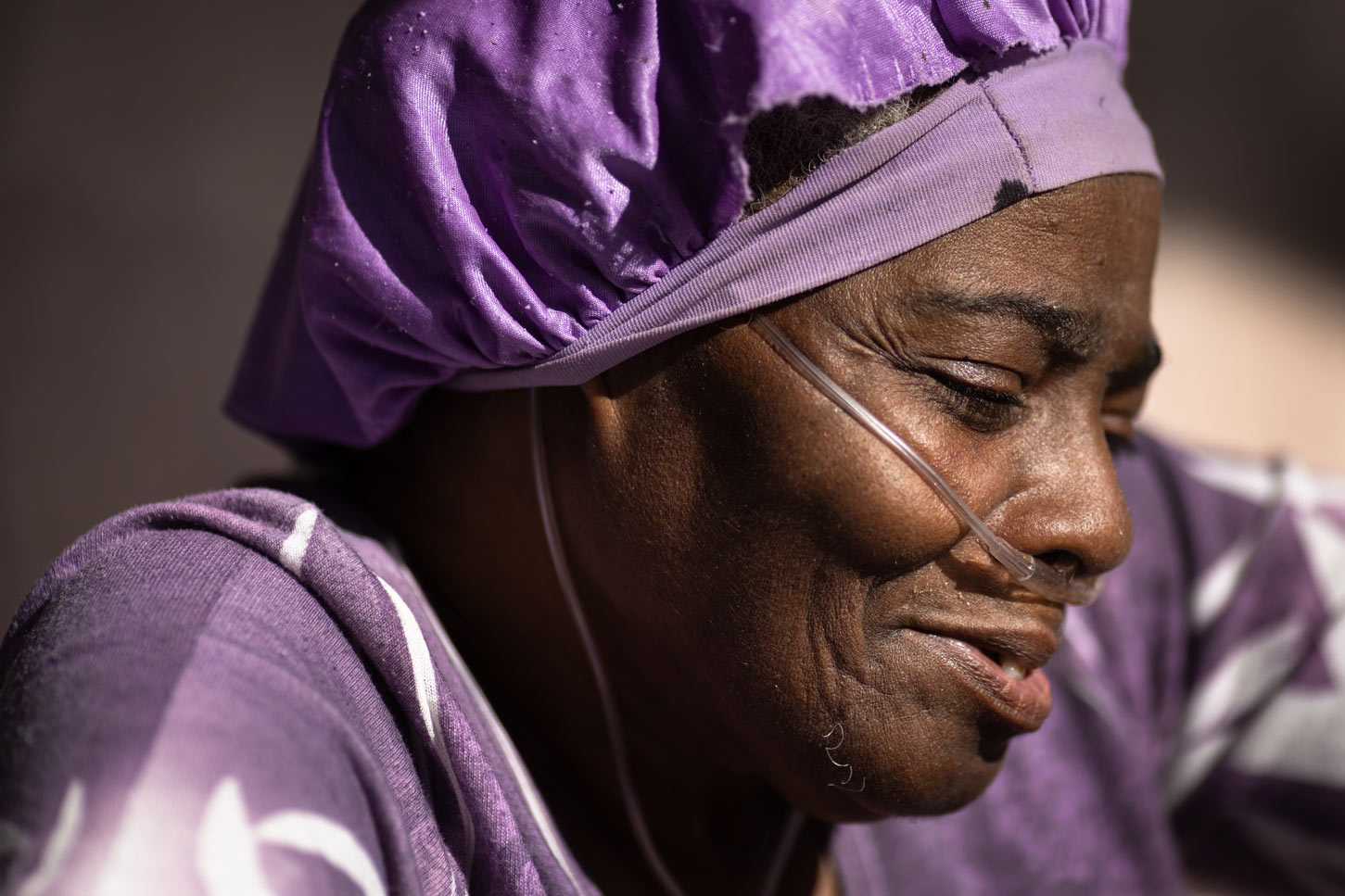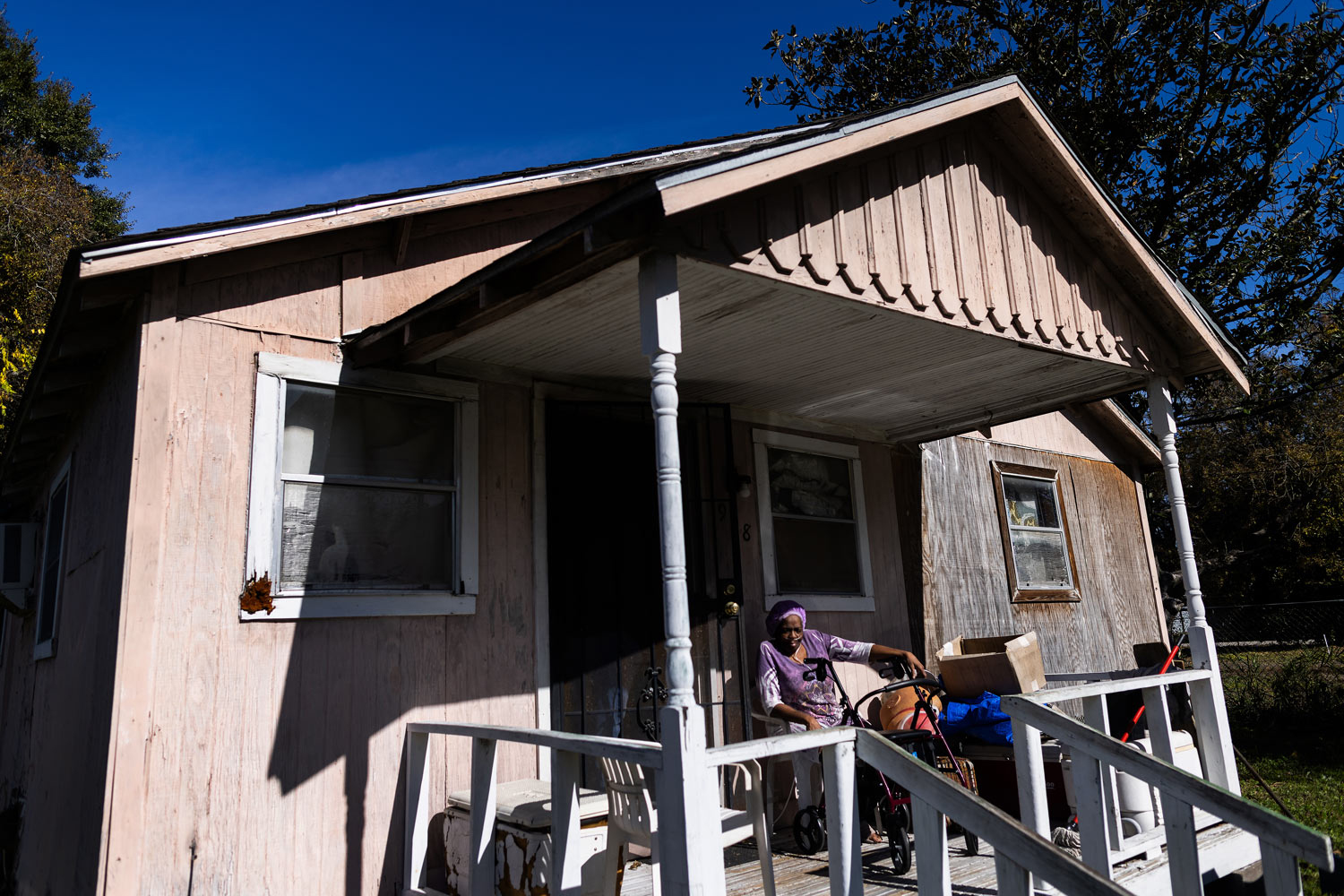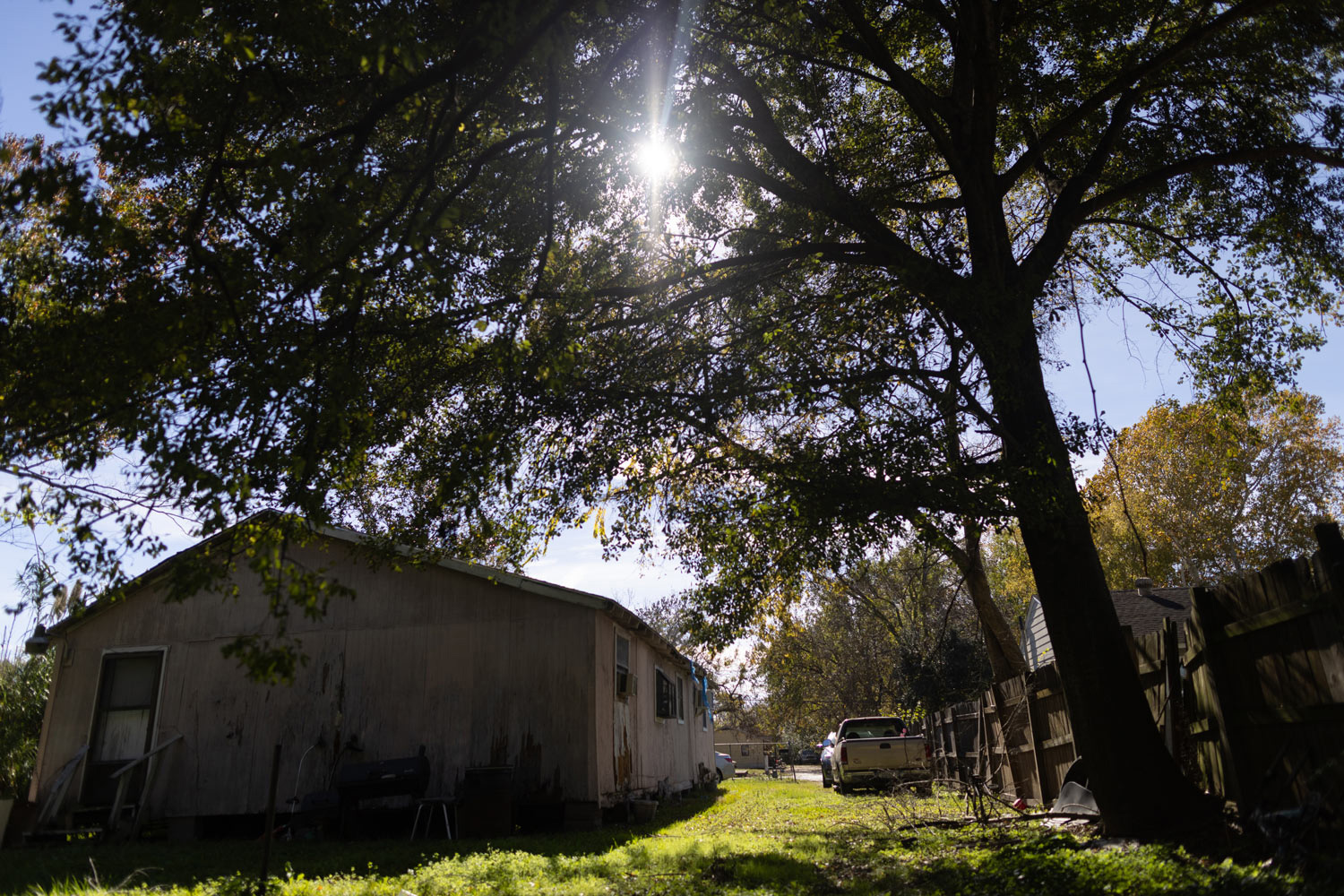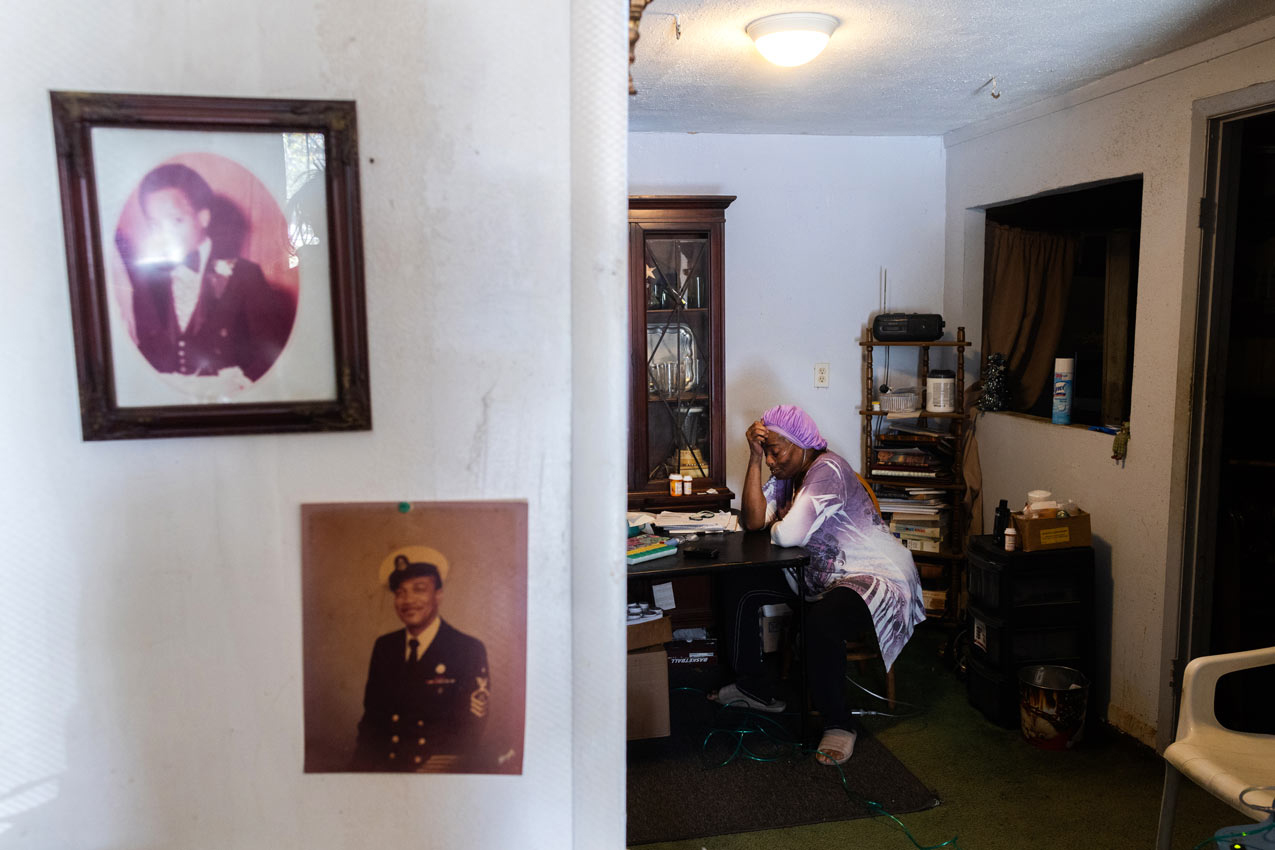|
Getting your Trinity Audio player ready...
|
Jessie Jacobs is the picture of resilience. It’s late morning, and she’s sitting on her porch, turning her head to the early December sun the way a flower leans into that same glow. She twirls the four-leaf clover I’d just plucked from her backyard in her fingers, and smiles through her words. The front door is open behind her, letting the fresh air into her dim living room, and ensuring the doorframe won’t crimp the ever-present tubes from her oxygen tank as they snake through the house, onto the porch, and into her nose.

Soon, this porch will be gone. After years living with its rickety boards, and raggedy-edged bottom no longer able to hide years of rot that set in from the catastrophic damage suffered during Hurricane Harvey, Jacobs is — finally — a top priority for the state of Texas. Her home will soon be rebuilt by the Texas General Land Office (GLO), which is expediting the project so Jacobs and her little house can receive the attention they need before the holidays.
It’s been a long, often frustrating journey to make it to this point. She’s been denied assistance from FEMA, and missed out on earlier funding and rehabilitation opportunities due to miscommunications and paperwork issues. But Jacobs has refused to give up. Instead she has continued to do what this woman does better than just about any person I’ve ever met in my life:
“I’ve just kept faith,” she says.
I first met Jacobs in June, when we volleyed missed phone calls at each other before finally meeting in person. I was writing then about the limitations of resilience — how the hope implied by the word can be twisted until it becomes mandatory homework we assign to people who've been knocked down, rather than offering them a hand. Resilience, I wrote in my July column, has become an excuse or an absolution rather than a promise.
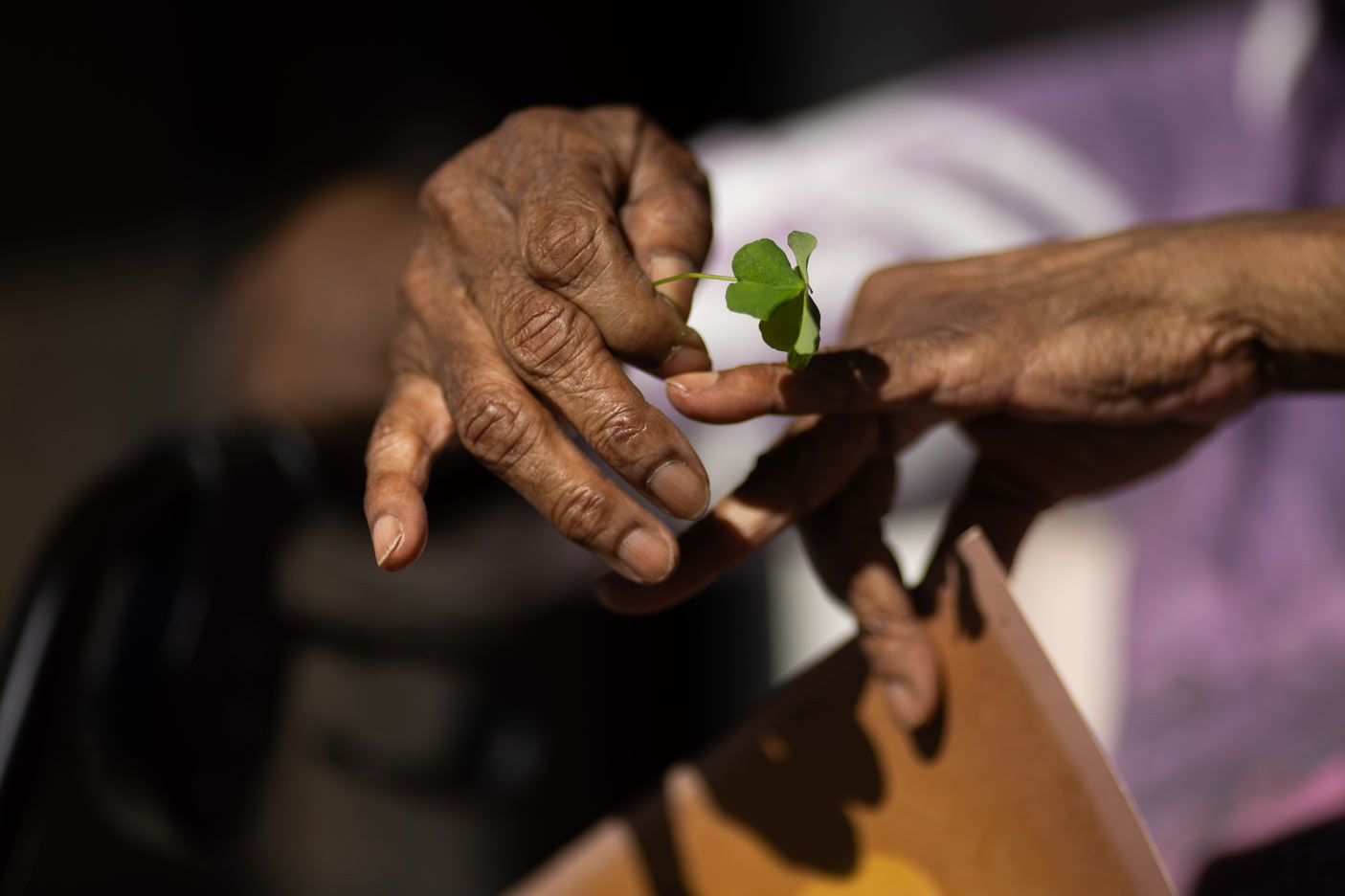
Of course resilience is exhausting, Jacobs told me then. But even after the 73-year-old Acres Homes resident had slipped through so many cracks in the social safety net that it looked like a freefall, she continued to press the importance of being resilient.
Resilience and faith, she says, are like weathering a storm. “Has there ever been a time the sun didn’t return?” Jacobs asks.
After Harvey damaged her home, Jacobs reached out for help, and none came. The first time I sat across from the black-topped fold-up card table in the center of Jacobs’ dining room, she thumbed through stacks of manila folders, containing FEMA denial letters and contracts showing that her siblings had signed over ownership of her beloved but increasingly moldy house to her after her parents’ death. She assembled a paper trail of all the ways she’d tried to access public funds made available to Houstonians whose houses desperately needed repair after Harvey. They’d all been dead ends.
I copied the hand-scrawled phone numbers from torn sheets of paper.
I’ll make some calls, I promised. Ask some questions. See what I could learn.
I spent the next few weeks in a maze of emails and phone calls with the city, the state and nonprofit organizations that work to help people in situations like Jacobs’. I refused to take voicemail for an answer. I had her sign an affidavit so government entities could release information about her, and returned to her house with updates. And along the way, I found several public servants who, upon hearing Jacobs’ story, went beyond what their jobs call them to do. (Non-profit workers were also key; when Jacobs told me in November that the cost of one of her medications had soared to $400 a bottle, I reached out to folks I’d met at Civic Heart, while writing about the Medicaid unwinding for help. One phone tree later, Jacobs’ pills are once again fully covered.)
To hear Jacobs tell it, she applied to the city’s Harvey Homeowner Assistance Program in 2019. That’s not exactly true, the city told me. Yes, city records show Jacobs submitted an intake application on Oct. 1, 2019. But a representative who called Jacobs to continue the process was unable to leave a message; Jacobs’ voicemail box was full. The city, it appears, stopped trying for the moment.
Then, on Oct. 21, Jacobs called again. She told the representatives she had submitted paperwork two weeks prior, and they scheduled an in-person appointment on Nov. 8. Jacobs, who uses a wheelchair and a wheeled walker, didn’t make the appointment. The city called her on Nov. 15 and again on Jan. 8, 2020 in attempts to reschedule, but they never reconnected.
Jacobs was under the impression the city lost her paperwork.
City documents show that Jacobs never actually applied.
It’s a Shakespearean misunderstanding — one that appears to have happened because the city took voicemail as an answer. The city closed Jacobs’ file in 2020; in 2021, the Homeowner Assistance Program stopped accepting applicants. The federal funds it once dispensed were moved to the GLO.
That’s where Jacobs submitted a new application in June. Or, at least she thought she did.
Jacobs, I learned, does not actually own her house. Like many families — and many in Acres Homes, specifically — Jacobs took on all the responsibilities of owning her generational home after her parents died without ever receiving the legal deed. The paperwork from her siblings has always been enough to handle local issues, like taxes. But according to Brittany Eck, a GLO spokeswoman, these documents “unfortunately do not meet the federal guidelines for proving ownership, which we need to prove before we can repair or demolish and rebuild a home.”
Again, Jacobs had thought she’d submitted a worthy application. Again, she would learn she hadn’t even climbed as far up the hill as she’d hoped to before a boulder started chasing her back down. I called Jacobs, and when it went to voicemail, I waited a day and called back. And then another day. When I finally heard her voice on the other end of the line, I told her what the GLO told me: She needed to record an heirship affidavit with the County Clerk’s office.
That’s not what she’d been told by her case manager, Jacobs said.
So I returned to Eck, who had written in her last email to “please let us know if she expresses any concerns to you that we might be able to assist with.” She seemed like a friendly beacon — the kind of person Jacobs would call “an angel” the way she refers to those she knows have helped propel this mission forward in recent months.
Eck and I traded emails.
Finally, I asked, “It sounds like Jessie needs help getting from her current situation — having the affidavits about her siblings' share in the property — to having the actual title in her name. Is that something y'all are helping with?”
Shortly thereafter, Jacobs received a call from the GLO. A case manager detailed the specific documents Jacobs needed, where and when to file them, and eliminated the possibility of another crippling miscommunication.
Jacobs and her daughter filed the proper paperwork at the clerk’s office.
Her home is now flagged for demolition, so a new house can be built in its place.
In the coming weeks and months, engineers will draft the plans for Jacobs’ new, three-bedroom home to be built in the place where the current one tries its best to stand. More than six years after Harvey, rebuilding Jacobs’ house is now being deemed a high priority according to the state, as Eck says “we’ve notified the contractors that we want them to expedite this application faster as we want to get it moving before the holiday season.”
When Jacobs first shared this good news from across that black-topped card table last month, I teared up in surprise. This wasn’t my first time writing about an older woman who had been kept from the relief she needed by a maze of red tape. It wasn’t even my first time trying to unwind that red tape, and turn it into a ribbon of connection between agencies, hoping for a happier ending. But it is certainly the first time I've seen that red tape tie itself into such a beautiful bow.
“You’re a mustard seed,” I told her, laughing through my tears as I remembered the parable she quotes with determination — the one from the Bible that states that even the smallest object, like a mustard seed, can move a mountain if it leans into its faith.
“I’m a mustard seed,” she replied. “And I have my angels.”
Share your Houston stories with me. We can start on Twitter, Facebook and Instagram. Or you can email me at [email protected].


